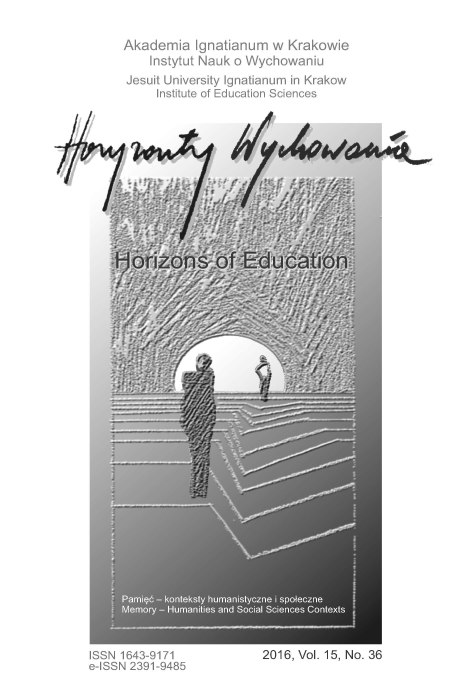Pamięć pokoleń. Historie rodzinne w przekazie międzypokoleniowym
The Memory of Generations. Family Histories Passed on by Several Generations
Author(s): Beata Topij-StempińskaSubject(s): History, Philosophy, Social Sciences, Language and Literature Studies, Education, Cultural history
Published by: Uniwersytet Ignatianum w Krakowie
Keywords: pamięć pokoleń; akcja „Wisła”; przesiedlenia; tożsamość; mniejszość narodowa
Summary/Abstract: CEL NAUKOWY: Podjęte rozważania będą dotyczyć pamięci pokoleń związanej z wydarzeniem historycznym, jakim były przesiedlenia rodzin w ramach akcji „Wisła”. Celem artykułu jest przybliżenie pamięci pokoleń związanych z konkretną historią rodzinną – przesiedleniem oraz wskazanie na znaczenie tego wydarzenia dla tożsamości pokolenia wnuków.PROBLEM I METODY BADAWCZE: Pamięć o przeszłości własnej rodziny, często jej niełatwych losach, np. wysiedleniach, służy budowaniu świadomości i tożsamości kolejnych generacji. Badaniami objęte zostało pokolenie wnuków urodzone w Bieszczadach w latach 60. i w pierwszej połowie lat 70. Wybrałam pokolenie wnuków, których dziadkowie zostali przesiedleni w ramach akcji „Wisła” z terenu Bieszczad. Badania przeprowadzone zostały metodą wywiadu narracyjnego.PROCES WYWODU: Pamięć pokoleń stanowi część szerszego procesu rekonstrukcji przeszłości, ponieważ to świadomość wspólnej historii jednoczy pokolenia. Tylko w procesie komunikacji między pokoleniami starszym a młodszym możliwe jest przekazanie i odtworzenie przeszłości, która nie stoi w sprzeczności z pamięcią wspólnoty. Odwołując się do naukowych opracowań dotyczących problematyki pamięci zbiorowej, podjęto badania, które ukazały znaczenie historii rodzinnej dla rozumienia własnej tożsamości przez kolejne generacje. WYNIKI ANALIZY NAUKOWEJ: Z przeprowadzonych badań wynika, iż w przypadku trzeciego pokolenia urodzonego w Bieszczadach przekazana została pamięć o akcji „Wisła”, jednak jest ona traktowana przez pokolenie wnuków raczej jako jedna z historii rodzinnych, która została wpleciona w „meandry wielkiej historii”, a nie jako element identyfikacji narodowej. Paradoksalnie sytuacja taka może być właśnie wynikiem powrotu dziadków w rodzinne strony.WNIOSKI, INNOWACJE, REKOMENDACJE: Wyników tych badań nie można uogólniać. Można je jedynie odnieść do tej grupy badanych. Dla potwierdzenia wyników tych badań istotne będzie przeprowadzenie badań na większej grupie badanych. Badania takie, być może, pozwolą ustalić przyczyny „zanikania”tożsamości ukraińskiej w trzecim pokoleniu wśród rodzin, które powróciły w Bieszczady po wysiedleniu w ramach akcji „Wisła”.RESEARCH OBJECTIVE: The undertaken considerations will refer to the memory of generations connected with a historical event, namely, the forced resettlement of families as part of the Operation “Vistula.” The aim of the article is to familiarise readers with the memory of generations connected with a particular family history – resettlement, as well as to indicate the significance of this event for the identity of the grandchildren’s generation. THE RESEARCH PROBLEM AND METHODS: The memory of one’s family past, often their hardships, for instance, forced resettlement, is conductive to create an awareness and identity of subsequent generations. The research includes the generation of grandchildren born in Bieszczady in the 1960s and the first half of 1970s. I have selected the generation of grandchildren whose grandfathers were resettled as part of the Operation “Vistula” from the area of Bieszczady. The research was conducted on the basis of narrative interviews. THE PROCESS OF ARGUMENTATION: The generations’ memory constitutes a part of a wider process of the past reconstruction because it is an awareness of common history that unites generations. Only in the process of intergenerational communication between the elderly and the young is it possible to convey and reconstruct the past, which does not contradict the memory of the community. Referring to scientific studies concerning the memory of the community, research was undertaken which has indicated the importance of family history in understanding their own identity for subsequent generations.RESEARCH RESULTS: The conducted study indicated that in case of the third generation, born in Bieszczady, the memory of the Operation Vistula has, indeed, been conveyed. However, this experience is treated by grandchildren rather as one of many family histories which was intertwined in the “meanders of great history” and not as an element of national identification. Paradoxically, such a situation may, in fact, be the result of the grandparents’ return to their homeland. CONCLUSIONS, INNOVATIONS AND RECOMMENDATIONS: The research results cannot be generalized. They can only be applied to this research group. In order to confirm the research results it is essential to conduct research on a bigger group of respondents. Such research may allow to establish reasons for the “disappearing” of their sense of Ukrainian identity in the third generation among families who returned to Bieszczady after resettlement as part of the Operation “Vistula.”
Journal: Horyzonty Wychowania
- Issue Year: 15/2016
- Issue No: 36
- Page Range: 29-45
- Page Count: 17
- Language: Polish

